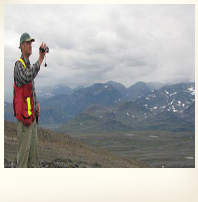

I was born and raised in St. John's, Newfoundland, and received my B.Sc. from Memorial University of Newfoundland (MUN), my M.Sc. from the University of British Columbia, and my Ph.D. from MUN. I was in university for twelve years. I became interested in geology while still in junior high school as I was always active in the outdoors and also enjoyed laboratory work, thus geology offered the best of both worlds; a job outside the office in summer, and winters in a lab analyzing rocks collected in the field. Since 1984, I have been a faculty member in the Department of Earth Sciences at MUN (Full Professor since 1995) and have engaged in mineral deposit research in Newfoundland and Labrador, other parts of Canada, Nevada, Botswana and Malaysia. I am also interested in ancient rocks (such as those found in northern Labrador) and the history of geological exploration in Labrador, including work conducted by aboriginal groups prior to contact with Europeans. I have sailed the northern Labrador coast, north of Nain, five times; my highest profile expedition was the subject of a Nature of Things episode, the Canadian Shield, on the Geologic Journey series, broadcast in 2007 on CBC, Radio-Canada, and Discovery Channel (US). I have supervised over 80 senior undergraduate and graduate theses and my former students literally work worldwide. I have acted as a consultant for companies, aboriginal groups and government agencies. I have been involved in research that has defined a wide variety of mineral occurrences in Labrador including, 2 billion-year-old coal and microfossils, kimberlites, and sapphires.
 Q: What is the title of your job and what do you do?
Q: What is the title of your job and what do you do?A: I am a professor of Earth Sciences and I conduct research on mineral deposits and general geology. I teach students and supervise some in their graduate and senior undergraduate thesis studies. I write papers and give talks.
A: I work for Memorial University of Newfoundland in the Department of Earth Sciences. My office is based in St. John's, Newfoundland, but I conduct my field work anywhere in the world; most especially in Labrador.
A: It varies, in the Fall and Winter I am mainly on campus, so I work a 40-60 hour week, in the Summer I am typically in the field and can spend 3-4 weeks at a time in 12 -15 hour days; when you are in a field camp you are essentially working 24 hour days.
A: Again, I'm mainly in the office in the Fall and Winter, and in the field in summer.

A: A very wide variety of analytical equipment; some of our lab facilities at MUN are world-class. In conducting field work I use sophisticated GPS equipment and also rely on a variety of analytical data derived from all scales.
A: In my position as a professor, one would require at a minimum post-graduate work, and most typically a PhD.
A: Enthusiasm, curiosity, wonder, an ability to work hard in often difficult conditions, and an ability to laugh.
In my job at the university, $90-120K; but one might be able to augment ones income though consulting.
A: The freedom to follow/research what interests me.
A: Again the freedom to pursue your interests, coupled with travel to some of the most wonderful places on the planet, attempting to understand and then describe some the fundamental operating principals of this most wonderful planet on which we have the privilege to live, working with your peers, teaching students, and in the end having somebody pay you to do all that.
 Q: What are the advancement opportunities for this career?
Q: What are the advancement opportunities for this career? A:What you make them.
A: In can be quite demanding, but that is another advantage in that it helps one maintain an active lifestyle.
A: I became interested in geology while still in junior high school as I was always active in the outdoors and also enjoyed laboratory work, thus geology offered the best of both worlds, a job outside the office in summer and winters in a lab analyzing rocks collected in the field.
A: Climbing the Torngat Mountains of northern Labrador. It's an adventure just to travel there, ah...but once you hike through the mountains!
A: Don't forget how privileged you are to have this opportunity and remember the beautiful Blue Planet that you are studying.